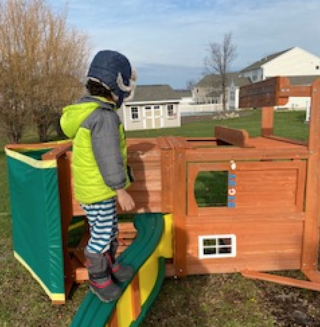Trauma
"Mama, This is So Hard": Vicarious Trauma and Personal Growth
Witnessing trauma can promote personal growth.
Posted March 5, 2022 Reviewed by Abigail Fagan
Key points
- When people observe traumatic events occurring to others, they can suffer vicarious trauma, also referred to as secondary traumatic stress.
- Lessons can be learned from witnessing the adversity of others.
- Vicarious posttraumatic growth can include benefits to one's relationships, resilience, self-confidence, and purpose in life.
- People struggling with challenges such as depression or anxiety disorders should be prepared to seek support when news becomes too intense.

During an emergency session of the United Nations General Assembly, Sergiy Kyslytsya, Ukraine’s ambassador to the UN, read screenshots of text messages between a Russian soldier and his mother moments before he was killed: “Mama, I’m in Ukraine. There is a real war raging here. I’m afraid. . . . Mama, this is so hard.”
Despite the geographical distance and differences in culture and language, the events of the war in Ukraine are being observed throughout the world in vivid reports and media, often in real time. While journalists have covered events on the scene in prior wars, social media is bringing this war to people also with graphic videos uploaded by those directly impacted by the violence, fear, and physical hardships of seeking shelter and escape.
When people observe traumatic events occurring to others, they can suffer vicarious trauma, also referred to as secondary traumatic stress (STS). Among those who serve the needs of others, secondary traumatic stress has been defined as the stress deriving from helping others who are suffering or who have been traumatized. Such stress can take a toll on a person’s personal and professional lives, inflicting the emotional and behavioral impacts that characterize the symptoms suffered after direct exposure to trauma. In other words, we can suffer vicariously when we witness the suffering of others. At varying degrees of severity, STS can include emotional exhaustion, sleep disturbance, recurring negative thoughts, and negative impacts on interpersonal relationships.
The risk of adverse effects of following coverage of the war poses questions about how much exposure might be too much. People struggling with existing challenges such as depression or anxiety disorders should certainly exercise caution and be prepared to seek support and limit exposure. Generally, however, there is also much to be gained from the painful experience of witnessing the adversity of others. Positive psychological changes have been reported following exposure to trauma. Posttraumatic growth refers to change that develops, not from the trauma itself, but from the struggle with trauma. Just as people can grow from overcoming adversity, people can also grow from experiencing trauma vicariously. Growth can include positive changes in interpersonal relationships, greater appreciation of life, greater confidence in one’s resilience, spiritual growth, and a keener awareness of new possibilities.
What can be learned from witnessing the horrors of war from afar?
- We can gain a deeper understanding of the power of resilience during a time of extreme hardship. There can be times when we feel that life is simply too hard. We can feel overwhelmed and question our ability to cope. We can take strength vicariously from observing the strength shown by those in Ukraine.
- We can develop greater determination and a respect for the value of persistence. When we wonder if we are capable of accomplishing difficult goals, it can be instructive to recognize the importance of persevering despite severe hardships.
- We can acquire greater sensitivity to what unites people despite differences in language or lifestyle. We can be drawn beyond our own perspective, born out of our circumstances, to recognize the common values and needs of people from different backgrounds. We can observe how the most basic human experiences of love, nurturance, and the pain of farewell and loss take priority whether in a bomb shelter, on a long journey to safety, or in our own lives.
- We can be inspired by the power of community and dedication to supporting one another, even at great risk to one’s own safety. War can reinforce the value of self-sacrifice, reminding us that being part of a community means that we are more than solitary beings. We are not alone. Citizens of countries throughout the world have gathered to show solidarity with Ukraine, to send humanitarian aid, to welcome refugees, and to lend military advice and collaboration.
- As we observe those who long to return home and those who refuse to leave it, we are reminded that home, family, and those who played important roles in our lives served as the foundation for who we have become. We can be motivated to reach out to those we might have lost contact with amid the hectic schedules of our lives.
- We can deepen our commitment to prosocial feelings and behaviors. Supporting and helping others enriches those who give and those who receive. Support can be offered in diverse ways. When direct support is not feasible, we can extend ourselves to those we can.
- The war reminds us of what is most important and can enrich our understanding of the meaning and purpose of our lives.
References
Batcho, K. I. (2022). The invisible wounds of war on its youngest victims. Psychology Today. https://www.psychologytoday.com/us/blog/longing-nostalgia/202202/the-invisible-wounds-war-its-youngest-victims
Shakespeare-Finch, J., & Lurie-Beck, J. (2014). A meta-analytic clarification of the relationship between posttraumatic growth and symptoms of posttraumatic distress disorder. Journal of Anxiety Disorders, 28(2), 223-229.
Yaakubov, L., Hoffman, Y., & Rosenbloom, T. (2020). Secondary traumatic stress, vicarious posttraumatic growth and their association in emergency room physicians and nurses. European Journal of Psychotraumatology, 11, 1830462.


